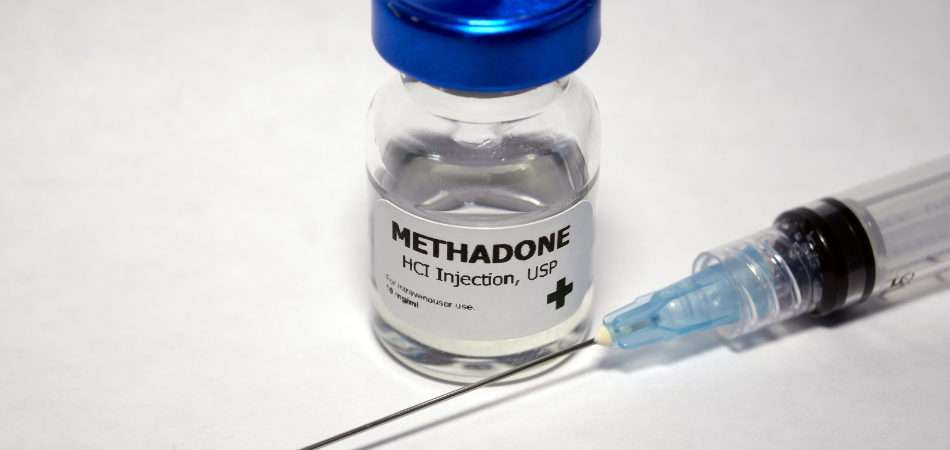Methadone addiction
Methadone is a medication that belongs to the opioid class of drugs. Commonly prescribed to alleviate pain and treat those addicted to other opioids such as heroin and codeine, methadone can be a highly effective drug when used correctly. However, extreme caution should always be practised if you or someone close to you is taking methadone, as the brain can become reliant on the pain-relieving effects brought upon by the drug. If you are unsure about the signs of methadone abuse or are concerned about a loved one, you can continue reading below.

How does methadone work in the body?
Methadone is such an effective medication for treating pain as it targets the brain’s opioid receptors, inducing feelings of relaxation whilst simultaneously reducing feelings of pain. It can also be administered to minimise or block the euphoric effects brought upon by other opioid drugs.
While methadone users tend to experience less severe side effects than those associated with harder drugs, some of the more common side effects of taking methadone can include:
- Headaches
- Loss of appetite
- Constipation
- Nausea and Vomiting
- Stomach pain
- Missed menstrual cycles in women
- Effected vision
Methadone is a slow-releasing chemical. This means that you may find its effects last for many days (leading to a higher risk of overdose). However, this is also dependent on the individual body, with some determining factors including metabolic rate, weight, height, and level of food intake.
How does methadone addiction develop?
Methadone addiction can develop if you abuse the drug or take it over extended periods of time. When an addiction forms, the body becomes physically and mentally dependent on the substance – a result of the chemicals in the methadone altering brain function.
Methadone is prescribed to treat severe pain or opiate addiction, both of which are challenging health issues to overcome. Being in significant pain for a long period of time can have a huge impact on your life, much in the same way as being addicted to opiates can. As methadone has the ability to reduce or mask pain and block the effects of particular habit-forming substances, it can be a powerful tool for change. However, these benefits can also pose a risk of becoming dependent on the drug to complete day-to-day tasks until users find themselves becoming totally reliant on the substance to function. For these reasons, treatment for pain relief should always be closely monitored by your doctor.
Should I be concerned about my methadone use?
If you have been using methadone for a long time, you may be concerned as to whether you have developed an unhealthy reliance on the drug. As methadone is a prescription medication, it can often be difficult to determine whether you are simply using the drug for medical purposes, or if you are abusing the substance in a manner which is harmful or unhealthy. A good indicator that your methadone use is crossing over into addiction is your dosage; if you are taking more methadone than has been prescribed by your doctor, or you are obtaining methadone through illegal sources, this is a cause for concern that should be addressed immediately to protect your wellbeing.
Signs and symptoms of methadone addiction
If someone you love is taking methadone or appears to be acting differently from their usual self, it could be an indicator that they have a methadone addiction. We have included some physical signs associated with methadone addiction below.
- Drowsiness
- Lack of focus
- Excessive sweating
- Financial issues
- A noticeable change in their usual activities, such as missing work or social events
- Drastic mood swings that are unusual for your loved one
- Getting into dangerous situations, putting themselves or others at risk of harm

If you are unsure whether you are beginning to display signs of methadone addiction yourself, some psychological symptoms include the following:
- Taking more methadone than you were first prescribed. This could be because you have built up a tolerance to the drug, and require more of it to feel the same effects.
- Panicking when you are running out of methadone. This could be due to you building a reliance on the drug, unaware of how to cope with life without it.
- Suffering physical or psychological health symptoms (such as insomnia or depression) when you haven’t taken methadone. This could be a result of your body reacting to a lack of methadone.
- Feeling like you are not the same person that you used to be. This could be due to your behaviour changing, which may cause you to treat your relationships differently, for example, choosing methadone over friends and family.
- Using methadone prescriptions faster than you used to, finishing them quicker than your doctor intended. This means that you are taking a higher dose than advised.
- Having strong cravings for the drug. You may focus your entire day on how to get more methadone because you need to meet your craving for it.
It can be challenging to approach the subject of addiction, but it is important that you do so if you notice any of the changes listed above. These methadone abuse signs can also be an indicator of methadone overdose, which can be fatal if urgent help isn’t sought out.
Detoxing from methadone safely
Like any addiction, quitting methadone can present you with some uncomfortable withdrawal symptoms along the way. This can happen, both when you start to reduce your dose of methadone, and when you quit taking the drug altogether. The withdrawal symptoms experienced will depend on your usage of methadone and can take a few days to begin. During this time, you can experience both physical and psychological symptoms, which are an unavoidable part of the methadone detox process. Due to the severity of withdrawal symptoms that can be experienced from the sudden change to your body, you should not try to complete a detox without professional support.
While each person will experience methadone detox differently, some of the symptoms commonly associated with methadone withdrawal include:
- Nausea
- Chills
- Drowsiness
- Respiratory distress
- Insomnia
- Aches and pains
- Weakness and fatigue

If you choose to detox from methadone in a specialised facility, professionals can taper the dose of methadone throughout the detox, which means you will receive reduced dosages of the drug until it hits zero. You may also be provided with medication to support you throughout the withdrawal process, administered medications to help ease some specific withdrawal symptoms, which can greatly help you to cope during the process. For this reason, it is always recommended that you choose to complete your methadone detox in a facility designed to cater to your needs. With measures taken to ensure you are as safe and relaxed as possible, this will reduce the chances of relapse, putting you on the best possible path to long-lasting recovery.
It is important to remember that completing methadone detox does not mean that you have fully recovered from methadone addiction. Methadone addiction involves a long-term recovery process, but there is support available that will address the psychological aspect of your addiction alongside the physical detox. You can complete a detox in a rehab facility, as well as many other recovery treatments over the course of your stay.
Treatment for methadone addiction
At a rehab facility, it is usual to begin your recovery journey with a detox. This will enable you to be in a better position to engage with the remainder of your addiction treatment. Methadone addiction can have strong psychological roots, which must be addressed to become free of addiction altogether. Proper methadone treatment requires a comprehensive approach, combining the physical detox with group work and one-to-one therapy. At Liberty House, we treat our clients holistically, providing a comprehensive rehab programme which caters to the physical, psychological and spiritual needs of the individual. Following your detox, you will be provided with a scheduled timetable of activities and therapies to approach the full scope of your dependence, some of which can include:
- Group therapy – to discuss your methadone dependence with the support of like-minded individuals who have experienced similar hurdles.
- Cognitive behavioural therapy (CBT) – to determine any unhealthy thought-patterns that may have prompted your methadone use, decreasing the risk of relapse after having left our centre.
- Mindfulness – In the early stages of methadone recovery, mindfulness can be an excellent tool to help clients slow down their minds and aid relaxation.
Myths about methadone
Methadone is a prescription drug and should only be obtained from a medical professional who is prescribing it as part of your treatment plan. However, due to it being a legally controlled drug, there are often misconceptions about its risks. You can find out some truths about methadone and its risks below:
“My doctor prescribed me methadone, so it can’t be harmful…”
…This is false. Methadone is a heavily regulated drug in the UK, with strict administering and dosage guidelines. It can still be a harmful drug, and many people underestimate the dangers associated with methadone misuse. For example, due to the strength of the chemicals in methadone, it has a prolonged effect on the human body that can last for several hours or even days. This creates a higher chance of overdose, because the drug might be taken while there are still large traces of the last methadone dose remaining in the body. When a methadone overdose is suspected, it is crucial that you seek medical advice and observation immediately.
“You can’t get addicted to a prescription drug…”
…This is also false. It is still possible to become addicted to prescription drugs, and it is crucial that caution is exercised when using these substances. In the case of methadone, there is a high risk of becoming addicted to the drug because it is often prescribed as a tool to support withdrawal from opioid addiction. This means that you may risk substituting one addiction for another, and many individuals find themselves falling into the same trap and requiring further treatment to relinquish their dependence on methadone.
“Methadone can make you feel high…”
…Methadone is prescribed and administered as part of a professional treatment programme. Taking methadone as instructed by a medical professional will not make you feel high. There may be some side effects during the start of your methadone treatment (as there are with many prescription drugs). However, over a short time period, these will diminish. If you feel high from taking methadone, it could be a symptom of methadone abuse.
We can help.
At Liberty House, we aim to tackle your methadone addiction holistically in a safe and non-judgemental environment. With a team of professionals on-hand with many years of experience treating all forms of addiction, you can feel confident in the quality of your care. Whilst in our facility, you will start with a methadone detox and then move on to a comprehensive treatment which includes group therapy, one-to-one therapy, and a variety of activities aimed to target the full scope of your dependence on methadone. If you would like to learn more about Liberty House and what we have to offer you, please do not hesitate to contact a member of our team right away.


